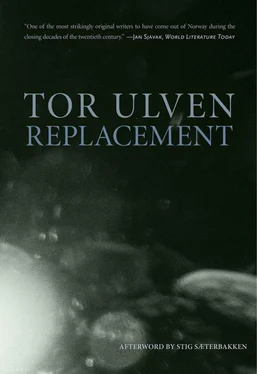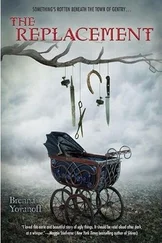It’s not completely dark yet, though you can see how the light outside (not sunlight, just a weak, vague gleam coming from nothing and nowhere) steadily dims, so the difference between the light of a few minutes ago and the light right now is like the difference between a wet and a dry sock, or to put it differently, darkness is beginning to overgrow the room, as grass, weeds, and rushes overgrow a forest pond, if darkness were a weed, it would definitely be overgrowing the room, but light still slips in through the curtains, especially through the slit in the middle.
It’s still summer, but it gets dark earlier. If you’re really quiet, you can creep to the window and peek out (outside it’s still daytime, or rather, it’s the remnants of the day (late evening) that you don’t have access to, all you can do is stare, like you stare at unattainable, expensive model airplanes in store windows), like you stared through the hospital window after visiting hours were over and they left without looking back. They had no idea you were watching, they seemed to be talking, once they even stopped and exchanged a glance, he looked back toward the pale yellow building (like he was thinking of returning?), but only back toward the entrance, which was beneath you, not toward the window way up where you stood, and then they grew smaller and smaller, like pieces on a pocket chess board, you’d thought, before disappearing down the stairs behind the hedge with its round, white flower bulbs (the bulbs were just a blur from the window). The stairs and the sidewalk were empty, but you’d still stared, stared at that emptiness, until two white hats had appeared, surfing along the hedge like paper boats in a stream, and two nurses, arms crossed and jackets over their shoulders, had come strolling along, until finally they were so close you had to press your nose against the glass to see them, and then you’d seen the door (or rather the last third of the door) shut behind them. It was before that, though, while your parents were still walking down the sidewalk, but before they’d disappeared behind the hedge, that you’d thought about death; or rather, you’d understood that if you hadn’t gotten the operation, you would’ve died. And your scar, which itches beneath your pajama shirt, that long, forceful line crossed by a bunch of smaller lines and surrounded by red, swollen skin, looks like a zipper (as if you could unzip yourself and look inside), or a rough seam (you’re a sack someone ripped open so they could take something out and maybe put something back before sewing you up again), anyway, your scar makes it look like you’ve been given a stamp of approval to live, as pigs in the slaughterhouse are given a blue stamp of approval to die.
You can’t see the curtains’ weave any longer, and you certainly can’t see the pattern (stylized clowns, sea lions, circus horses, and elephants repeating at regular intervals), though the small slit down the middle retains an echo of the day. If you listen closely, you can hear the clatter of plates and silverware in the sink, as well as the distant sound of a radio playing low, probably in some other apartment. When you get home late from a walk, you always notice that some windows in the building are dark, while others are light, and that there’s an absolute boundary between the dark ones and the light ones, though now it seems like every window in the apartment, no, in the whole building is part of a blazing spaceship en route through a dark cosmos endlessly far from earth, where you find yourself once again, in the dark.
Whenever you want. Nothing’s physically stopping you, nothing, that is, but the prohibition itself. Whenever you want, for example at the very moment the light leaking through the curtains changes from pale yellow-white to pale violet-white (that is, when the street lamp comes on, which will probably be soon), you can, without getting up, but just by stretching out your arm and extending your body as far as it will go, so far that it pulls at your scar, reach the switch (the knob that looks like a little round nose) and flip it, and be blinded by light suddenly filling the lampshade, your face, the bed, and part of the room. Now is the time you can’t take any more darkness. Now is the time you do it. You do it and hope that she doesn’t decide to poke her head in to see if you’re sleeping, and find that you’re not sleeping, that, quite the opposite, you’ve turned on the light, and, with a reproachfully startled, deeply disappointed exclamation, switch the light off again, this very moment, right now, before your machine is even complete. At first the bright sphere blinds you, and the stinging light forces you to blink and shut your eyes, as if they were full of soapy water, but eventually you grow used to the strong, dazzling glare, and it strikes you that if you stare at it long enough, you might go blind, completely blind, and then you’ll never have to see darkness again, not the darkness under the bed nor any other kind of darkness, and it won’t matter if the light is on or off, but then a terrifying thought hits you, namely, that if you go blind you’ll see darkness and nothing but darkness for all eternity, and it won’t just be dark under the bed, in the closet, in the corners, and so on, but dark overall, the same darkness that, you know, sits in the center of your eye like a hole in the ice, a hole covered by a transparent film, and if you go blind the film will break, and all the darkness that’s stored in your eye, and all the darkness stored in your mind’s eye, will come flooding out to drown the earth.
Once you’ve reached this terrifying point in your train of thought, you’re forced to continue staring at the light, because now you have to make sure that you’re not going blind, and so you continue to see a circle (the bulb) within another circle (the lampshade’s interior), a circle within a circle, like a yolk floating in an empty eggshell, a round bright ball seemingly held in place by some unknown magnetism or a gravitational force, and on the bulb’s matte surface (condensated white, like a breath fossilized upon the glass) you can distinguish a few letters and numbers, though they’re indecipherable, especially because the chance way the bulb’s been screwed in means you’re seeing them upside down; as you stare, the symbols appear to flicker and fuse, and within the dazzling, milky white field, some spots even appear brighter than others, but you know that those smoky-blue, ill-defined, irregular regions are actually plains, valleys, and craters on the surface, and that the biggest ones are called “seas” (one, you remember, is even called the Sea of Tranquility, and a sea with no water must indeed be tranquil); from the earth, these dark spots appear to form a rudimentary face, the so-called Man in the Moon, but as you’re walking along, you recall that in another part of the world the (supposed) shape formed by these spots is called the Rabbit, and that whatever pattern the spots actually form is no real shape at all.
They’re sleeping? Could they be out looking for you? No. They’re sleeping. The idiots are asleep, you think. As you can see, it’s not completely full yet, because the circle is broken by a dark smudge down on the lower left, as if part of the chalky surface somehow got erased (like a piece of chalk gets a flat edge when you write with it on the sidewalk), leaving behind an irregular surface, or as if it’s being gnawed to pieces by a giant cosmic moth (drawn to the moon like insects are drawn to lit bulbs). Still, you can clearly see that it’s not a flat, two-dimensional shape, because the shadow hints at a sphere, and you can almost see it rotating on its axis high above the vacant, unlit stretch of ground you’re just now approaching, a bright spot against a bluish-black, late autumn sky. When you take your eyes off the sky, where the first stars are starting to show, the very roadside you saw earlier is visible in the controlled, muscular light of a street lamp, and you remember that earlier in the day it was a yellowish green, rectilinear mess of grass and weeds along the side of the road, and that the plants had thrown long, sharp shadows across the sand, or had cast their reflections into puddles, swaying (as blade after blade gets caught in the draft and bent double, violently rocked until the shaking subsides to a small oscillation, then to a relative calm, until the next car passes or unless there’s more wind; like a wave passing through the grass on the roadside, up to the point at which there’s no more median and the side road joins the main road) in the wake of a passing car.
Читать дальше












